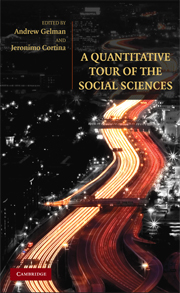Book contents
- Frontmatter
- Contents
- Preface: Learning to Think Like a Social Scientist
- About the Contributors
- PART I MODELS AND METHODS IN THE SOCIAL SCIENCES
- PART II HISTORY
- 4 Historical Background of Quantitative Social Science
- 5 Sources of Historical Data
- 6 Historical Perspectives on International Exchange Rates
- 7 Historical Data and Demography in Europe and the Americas
- PART III ECONOMICS
- PART IV SOCIOLOGY
- PART V POLITICAL SCIENCE
- PART VI PSYCHOLOGY
- PART VII TO TREAT OR NOT TO TREAT: CAUSAL INFERENCE IN THE SOCIAL SCIENCES
- References
- Index
6 - Historical Perspectives on International Exchange Rates
Published online by Cambridge University Press: 05 June 2012
- Frontmatter
- Contents
- Preface: Learning to Think Like a Social Scientist
- About the Contributors
- PART I MODELS AND METHODS IN THE SOCIAL SCIENCES
- PART II HISTORY
- 4 Historical Background of Quantitative Social Science
- 5 Sources of Historical Data
- 6 Historical Perspectives on International Exchange Rates
- 7 Historical Data and Demography in Europe and the Americas
- PART III ECONOMICS
- PART IV SOCIOLOGY
- PART V POLITICAL SCIENCE
- PART VI PSYCHOLOGY
- PART VII TO TREAT OR NOT TO TREAT: CAUSAL INFERENCE IN THE SOCIAL SCIENCES
- References
- Index
Summary
HISTORY AND SOCIAL SCIENCE
Before we take a look at an example drawn from twentieth-century economic history, let me recapitulate and expand a bit on what was said in Chapter 5 about the general question of history and quantification and on history's place in the social sciences. We've already seen that today history is the least quantitative of the social sciences. Most history Ph.D. candidates study neither mathematics nor statistics as part of their training to be a historian, and history retains many of the peculiarities that come with its position as the first social science to have more or less uniform professional standards inculcated by training at the university level. The principles governing the professional historian's inquiries are still largely those laid down by the German school of Leopold von Ranke (1795–1886) in the early nineteenth century, and the wellsprings of the Rankean method are to be found in classical philology, which emphasized textual criticism and the close reading of original documentary sources, although, as mentioned in Chapter 5, this did not at all rule out the inclusion of quantitative material.
The superiority of the methods of the hard sciences was not so obvious in Ranke's time, and Ranke can certainly be excused for taking as his model classical philology, which had been enormously successful in its pursuit to establish the ur-texts of the ancient authors.
- Type
- Chapter
- Information
- A Quantitative Tour of the Social Sciences , pp. 59 - 82Publisher: Cambridge University PressPrint publication year: 2009



